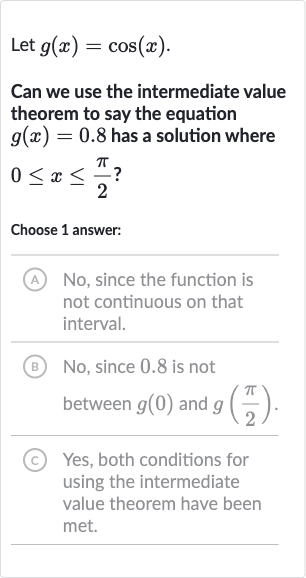AI tutor
Welcome to Bytelearn!
Let’s check out your problem:

Let .Can we use the intermediate value theorem to say the equation has a solution where ?Choose answer:(A) No, since the function is not continuous on that interval.(B) No, since . is not between and .(C) Yes, both conditions for using the intermediate value theorem have been met.
Full solution
Q. Let .Can we use the intermediate value theorem to say the equation has a solution where ?Choose answer:(A) No, since the function is not continuous on that interval.(B) No, since . is not between and .(C) Yes, both conditions for using the intermediate value theorem have been met.
- Evaluate : Evaluate which is at ..
- Evaluate : Evaluate which is at ..
- Check interval for : Check if is between and .Since and , and 0 < 0.8 < 1, we can say that is between and .
- Verify continuity on interval: Verify if is continuous on the interval .The cosine function is continuous everywhere on the real number line, including the interval .
- Apply intermediate value theorem: Apply the intermediate value theorem. Since is continuous on and is between and , by the intermediate value theorem, there must be some in such that .
More problems from Solve quadratic inequalities
QuestionGet tutor help
QuestionGet tutor help
QuestionGet tutor help
QuestionGet tutor help
QuestionGet tutor help
QuestionGet tutor help
QuestionGet tutor help
